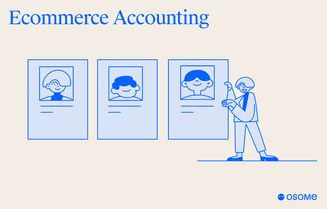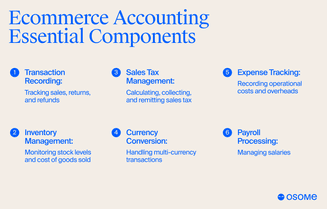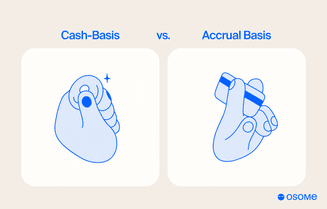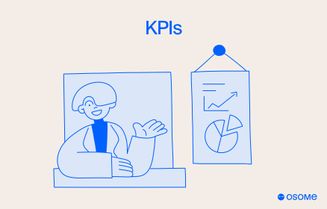Ecommerce Accounting in Hong Kong: Essential Insights for Online Businesses
- Published: 26 June 2024
- 18 min read
- Ecommerce


Gabi Bellairs-Lombard
Author
Gabi creates content that inspires. She's spent her career writing compelling website copy, and now she specialises in product marketing copy. As the voice of our products and features, Gabi makes complex business finance and accounting topics easy to understand. Her top priority is ensuring that her words impact and inspire her readers.
Struggling with the financials of running an online store? Ecommerce accounting is more than just balancing the books; it’s key to growth and compliance. This guide to ecommerce accounting breaks down sales taxes, expense tracking, and inventory management for the ecommerce world. We’ll help you make sense of the financial reports, optimise your accounting system, and take control of your ecommerce success.
Key Takeaways
- Ecommerce accounting is tailored for ecommerce companies, helping to manage sales tax, currency conversion, and complex financial transactions to ensure accuracy, compliance, and informed decision-making.
- Ecommerce accountants provide specialised expertise in managing financial records, strategic planning, and compliance with taxation laws, which is beneficial particularly for businesses across multiple jurisdictions.
- Maintaining strong ecommerce accounting practices involves detailed ecommerce bookkeeping, strategic financial reviews, tax planning, and the use of ecommerce accounting software for efficient operations and compliance.
What Is Ecommerce Accounting?
Ecommerce accounting is designed for the specific needs and transactions of online businesses. It involves managing and tracking a multitude of transactions and records of an ecommerce operation. It’s more than just transaction recording. It handles the complexities of sales tax and currency conversion. The purpose of ecommerce accounting is to get the financials right, be compliant with tax, support payroll, assess the business’s financial health, control cash flow, manage inventory, and make financial forecasts.
For a streamlined accounting process, Osome offers specialised ecommerce accounting services. Our expert ecommerce accountants handle the unique challenges of online businesses, ensuring accuracy and compliance. Let Osome manage your accounting routine so you can focus on growing your business.

Ecommerce accounting involves:
- Tracking daily sales
- Accounting for expenses
- Inventory management
- Financial planning
Accurate accounting is key to making business decisions and knowing your financials. Ecommerce accounting is more than just recording financials. It shows the financial trajectory as your business grows, including revenue, expenses, profit and loss statements.
Using ecommerce accounting means better data-driven decisions, compliance with regulations, and avoiding tax penalties. Good accounting is essential to understanding the overall business performance of an ecommerce store and making business decisions. An ecommerce accounting system is crucial to tracking income, expenses, and supporting business decisions and financial projections.
The Role of Ecommerce Accountants
Ecommerce accountants manage financial data and tax regulations for online businesses, giving them the tools for growth. They compile detailed financial reports, including inventory purchases, operating and marketing expenses, and revenue, which are essential for financial statements like the income statement and cash flow statement. They help business owners answer questions like staffing costs, pricing for new products, and expansion viability.
Outsourcing bookkeeping to professional ecommerce accountants means:
- Record management and tax compliance
- Avoiding the headache of in-house staff
- Access to experts with years of experience
- Financial transaction recording
- Compliance with all regulations
- Access to specialised ecommerce accounting software
- Specialised business accounting expertise
- Especially useful for businesses operating across multiple jurisdictions where tax laws can be vastly different.
The role of an ecommerce accountant is to:
- Manage financial records and transactions
- Provide insights to ecommerce sellers to make data-driven decisions
- Optimise financial processes with expertise in ecommerce platforms and business accounting
- Show the true financial state of the business
- Identify and fix issues quickly
Key Components of Ecommerce Accounting
Ecommerce accounting includes basic bookkeeping functions like invoicing, payroll and balance sheets and more complex tasks like financial statements and tax strategy. An ecommerce accounting system must be able to track and manage customer returns without distorting financials. This level of detail is essential for financial analysis and planning.
The ecommerce accounting components also play a big role in business growth. By providing information on profitable products, major expenses, and opportunities to increase profit margins, ecommerce accounting helps business owners make business decisions. Choosing between cash basis accounting or accrual accounting is another important decision, as a business can’t use both accounting methods simultaneously.
Understanding these components helps ecommerce sellers manage inventory effectively, maintain accurate accounts payable, and ensure compliance with sales tax liability. This comprehensive approach supports better financial reporting and overall performance.

Recording financial transactions
Transaction recording in ecommerce accounting means:
- Documenting sales
- Documenting returns
- Documenting chargebacks
- Reconciling a business account
- Generating an income statement for accurate reporting
A transaction occurs when a business spends, receives, or requests money. The chart of accounts, which summarises transactions and covers assets, liabilities, equity, revenue, and expenses, plays a big role in this process.
To record sales:
- Document the sale when a customer makes a purchase, including the date, product, amount, sales tax and payment method.
- Record returns as a separate expense.
- Record chargebacks as a separate expense.
By following these steps, you can track your sales and expenses.
Bank reconciliation means:
- Compare bank account activity with accounting software records to ensure accuracy
- Categorise transactions to maintain an accurate profit and loss statement
- Reconcile bank accounts monthly to avoid discrepancies.
Ecommerce tax management
Ecommerce tax management means tracking state and local taxes, handling quarterly estimated taxes and year-end filing. The Supreme Court ruling in South Dakota v. Wayfair Inc. has made it clear that states can require out-of-state sellers to collect and remit sales taxes, so ecommerce businesses must manage ecommerce sales tax collection and remittance carefully and not record these taxes as income.
To comply with various sales tax and income tax laws and take advantage of tax deductions, ecommerce owners should engage with tax professionals who know ecommerce. This goes beyond sales tax to include:
- Tracking other taxes
- Calculating estimated taxes
- Year-end filing
- Managing forms for contract workers
A business’s sales tax nexus is based on physical presence or economic activity in a state.
Maintaining Financial Health for an Ecommerce Business
Regular review of financial statements like profit and loss and balance sheets is essential to check the financial health of an ecommerce store. These reports will give you insight into the financial performance and risk of the business and help you make informed decisions. Usually, these reviews are done monthly to stay on track and ensure your business accounting system is effective.
Inventory reports will give you insight into business financial health and help you make strategic decisions, net sales will directly impact the financial health of the business. By keeping an eye on financial statements, including cash flow and income statements, ecommerce store owners can see trends, manage expenses and plan for growth. This proactive approach to financial management is key to a healthy and profitable ecommerce business.

Profit and loss statements
Profit and loss (P&L) statements summarise income and expenses and will show you the taxable income and financial performance of the business. Understanding the Gross Profit Margin (GPM) is important to evaluate the profitability and success of the business operations. A clean and tidy P&L Statement is essential when selling a business.
Gross sales need to be separated from related expenses like merchant/processing fees for a clean financial presentation on the P&L Statement. Key financial metrics from the P&L Statement are:
- Cost of Sales
- Customer Acquisition Costs
- OPEX
- Gross Profit
- Contribution Margin
- EBITDA
Gross profit is calculated by subtracting the cost of goods sold (COGS) from net sales; gross margin is the amount left over after COGS is accounted for as a percentage of sales.
Balance sheets
Balance sheets give you a snapshot of the business’s financial position, assets, liabilities and equity. In general, assets mean what the business owns, liabilities mean what the business owes, and equity is the difference between assets and liabilities. The main accounting equation for a balance sheet is Assets = Liabilities + Equity.
In ecommerce accounting, a balance sheet shows the assets versus liabilities of the business at a point in time. This information is important to understand the overall financial health of the business and to make informed decisions. By regularly reviewing the balance sheet, ecommerce platform owners can ensure the business is financially stable and ready for growth.
Cash flow statements
Cash flow statements will show the inflows and outflows of cash, real money movements and will report on how much cash is in the business at a point in time. The cash flow statement will break down cash activities into operating, investing and financing activities and will give you an overall view of how the business is using and sourcing cash. Cash flow management is key for businesses to budget accurately and avoid liquidity issues, particularly when managing more than one sales channel.
Reconciling cash inflows and outflows will allow you to know where your money is going, which is essential for cash reconciliation and financial control. By reviewing these statements regularly, ecommerce business owners can ensure the business has enough cash to cover short-term operational needs and can plan for future growth and investment opportunities.
Two Main Types of Accounting Methods
There are two main accounting methods for ecommerce merchants: cash-based and accrual accounting, each with a different way of recording transactions. Cash basis is considered the ‘starter’ method for small businesses because of its simplicity. You can file taxes based on cash received and expenses paid. This method is ideal for small businesses with simple inventory turnover that do less than $25 million over 3 years.
The downside of a cash basis is it may not reflect the financial health of the business in situations with large accounts receivable or payable. Accrual accounting will give a more accurate picture of the business's financial standing, long-term and short-term, by tracking value and expenses more precisely. This method is better for growing businesses with more complex transactions.

Cash basis accounting
Cash basis accounting is better for smaller businesses that deal primarily in cash transactions and don’t have inventory. Startups with simple transactions may opt for cash basis accounting as it’s a clear and simple way to track their business finances. One of the main advantages of cash basis accounting is its simplicity and immediate cash flow reflection, so you can see the business liquidity. This accounting method also helps provide an accurate financial picture for simpler operations.
Using the cash basis method will give you better tax control by recognising expenses only when the cash is actually paid out, potentially deferring tax liabilities. This method will allow you to manage your cash flow better and is ideal for those with limited accounting skills or resources. It’s a simpler accounting method suitable for smaller ecommerce companies.
Accrual accounting
Accrual accounting will give you a more realistic view of your income every month and more accurate financial projections. This method includes:
- Recording transactions as they happen
- Matching revenue with costs
- Accounting for sales returns
- Bad debts
For established businesses, accrual accounting is recommended as it reflects the financial health and activities of the business.
By using accrual accounting, you will have a clearer picture of your financial situation, which is essential for strategic decision-making and long-term planning. This method will ensure all revenue and expenses are recorded in the period they occur, giving you a more overall view of the business's financial standing performance.
Essential Bookkeeping Tasks for Ecommerce Stores
Bookkeeping tasks for ecommerce stores include organising bank statements and receipts, managing purchases and reconciling accounts. Accounting software can centralise all financial tasks and integrate services like payroll and tax compliance, making bookkeeping easier. To keep your financial records in order, you need to reconcile bank accounts and credit card statements weekly so all transactions are recorded properly. These regular accounting tasks ensure accuracy and compliance.
Doing bookkeeping tasks regularly, like reviewing outstanding invoices and bills monthly, will help you manage your cash flow and track overdue payments. Reconciling accounts regularly will help you identify discrepancies and resolve them quickly. If you find these tasks time-consuming or challenging, consider Osome's professional bookkeeping services. Our experts can handle all your bookkeeping needs, allowing you to focus on growing your business.
Cash flow monitoring is key to ensure the business has the liquidity to cover short-term operational needs.
Organising bank statements and receipts
Organising bank statements and receipts is important for:
- Accurate financial reporting
- Tax preparation
- Inventory management
- Balance sheet analysis
- Financial transparency
Having your financial records in order through statements and receipts will give you financial transparency and tax preparation.
Managing inventory purchases
Managing inventory purchases is important for tax purposes and cost of goods sold (COGS) tracking. A common ecommerce accounting mistake is not tracking COGS properly, so profitability metrics are incorrect. Tracking how much inventory you have across multiple platforms and calculating COGS accurately is difficult due to shipping costs, discounts and returns.
Proper inventory management is important in ecommerce accounting. Good inventory management will help you avoid stockouts or overstocking, which can affect business operations and customer satisfaction. COGS tracking will benefit ecommerce businesses by giving you accurate profit numbers and informed pricing.
Navigating Sales Tax Compliance for Online Sales
Sales tax compliance for online sales means understanding sales tax nexus, using sales tax software and monitoring online business laws. A sales tax nexus in a state means an ecommerce seller has to collect and remit state taxes, which can be established by business location, warehouses, employees, bank account, or sales thresholds.

Using sales tax software will help ecommerce businesses manage the collection and remittance process by:
- Applying rate and regulatory changes automatically
- Monitoring and adjusting to online business laws in each state
- Knowing the payment deadlines for sales tax remittance to stay compliant.
- Using such tools ensures compliance with various sales taxes and reduces errors.
Technology and software are key for smaller ecommerce retailers to manage the complexity of different sales tax laws and avoid common mistakes like incorrect sales tax reporting.
Optimising Ecommerce Platforms with Accounting Software
Connecting accounting software to ecommerce platforms and payment gateways has many benefits:
- Financial management simplified
- Real-time financial tracking
- Automated accounting tasks
- Financial management made easy
- Storage and retrieval of financial data made efficient
Cloud accounting has these benefits for ecommerce:
- Ease of use
- Support for 3rd party app integrations
- Automation tools to transfer data and minimise ecommerce accounting errors
- Financial report reliability
Real-time transaction tracking and multi-jurisdiction sales tax management are important for businesses with high transaction volume.
Selecting ecommerce accounting software
Choosing ecommerce accounting software should consider industry compliance requirements, desired features, integrations, growth plans, and ease of use. Businesses should prioritise essential accounting software features like accounts receivable and payable tools, inventory tracking, payroll, time tracking, and the ability to choose between accrual and cash basis accounting, as well as a prebuilt ecommerce-focused chart of accounts.
Osome's accounting software offers all these features and more, tailored specifically for ecommerce businesses to streamline financial management and support your growth effortlessly. Make sure to familiarise yourself with the features of our accounting services to learn more!
The software should be user-friendly so that the business owner and the team can manage finances. For customised accounting software recommendations, business owners should talk to their accountants and discuss the following:
Size of their financial operations
- Industry compliance
- Reporting
- Integrations
- Budget
Try out the software with a free trial and consider your business circumstances to make an informed decision for your business.
Automation features to save time
Automation features in accounting software transfer data, reduce manual errors and make financial tasks more efficient. These automation features that can handle repetitive tasks like importing transactions, generating invoices and calculating taxes.
Accounting software can be extended with add-ons like:
- Remote access
- Online payment gateway
- Ecommerce software integration
- Tax software compatibility
By using these automation features, ecommerce businesses can focus on growth and not bookkeeping.
Financial Metrics Every Ecommerce Seller Should Know
Ecommerce sellers should review key performance indicators (KPIs) like gross profit margin, customer lifetime value and customer acquisition cost regularly for decision making. Accurate ecommerce bookkeeping and financial forecasting are important for business decisions like product pricing, inventory management, and assessing business performance.
Metrics like customer lifetime value, customer acquisition cost and gross margin are important for justifying marketing spend and evaluating the long-term viability of the business. Gross profit is the revenue after the cost of goods sold is subtracted from total sales and is key to understanding the overall profitability of an ecommerce platform.

Gross profit and margin analysis
Gross profit and margin analysis require accurate COGS, which affects profitability and pricing. Accurate cost of goods sold is important for businesses as it affects gross profit margin, taxable income and pricing.
Net profit margin is the percentage of revenue left after all costs, expenses and taxes are accounted for and is an important indicator of the business’s profitability. Competing on price alone will start a race to the bottom and is an unsustainable strategy as bargain hunters have low brand loyalty.
Average order value allows businesses to understand and strategise customer spending habits, which is important for sales channel and pricing strategies.
Customer lifetime value and acquisition costs
Customer lifetime value and acquisition cost are important metrics for ecommerce businesses. Acquisition cost is the total cost of acquiring a new customer. Making additional sales to existing customers is more cost-effective than acquiring new ones. This is why customer retention strategies are important.
Understanding customer lifetime value is key to develop targeted marketing strategies that optimise acquisition costs. Reviewing marketing spending against customer lifetime value and acquisition cost helps businesses to allocate their budget better to retain customers and increase profitability.
Ecommerce Accounting Best Practices
Ecommerce accounting's best practice s are to have a single dataset, be tax compliant and follow simple rules to run a smooth business. A single dataset is key to strategic planning and helps execute business strategies.
Being tax compliant is one aspect of ecommerce accounting that requires knowledge of the rules and diligence to follow them. Ecommerce accounting manages transactions to avoid complications and clarity in the business’s financials.
By following these best practices, ecommerce store owners can be accounting efficient and accurate, ensuring their accounting tasks are streamlined and effective.
Separating business and personal finances
Separating business and personal finances is important to be accounting best practices and to avoid complications during audits. To separate business and personal finances:
- Have a business bank account and a separate account for personal use
- Use separate credit cards for business and personal expenses
- Track business subscriptions separately
This makes it easier to track and record all business transactions.
By having separate financial accounts, ecommerce business owners can:
- Have accurate financial reports
- Be able to separate personal and business expenses
- It is important to be tax-compliant and to have a clear financial picture of the business.
Planning for estimated quarterly business taxes
Estimated quarterly business taxes are required if the ecommerce business tax liability is over $1,000. Quarterly estimated tax for ecommerce transactions involves tracking and remittance, and the IRS uses the last tax return to calculate the dues.
Tax planning ahead allows for strategic decisions to claim deductions. Accounting software helps to manage quarterly income taxes by automating the process of setting aside a percentage of monthly income. By planning ahead, businesses can stay tax-compliant and avoid penalties. Engaging in proactive tax planning is essential for maintaining financial stability and compliance.
Multi-Channel Ecommerce Sales
Multi-channel ecommerce sales involve managing sales across multiple sales channels and require streamlined processes to keep inventory and financials in sync. Ecommerce accounting should track costs and cash flow across multiple sales channels for overall reporting.
ETL (Extract, Transform, Load) and ELT (Extract, Load, Transform) are the building blocks to consolidate sales data from multiple platforms. ETL involves extracting data from multiple sources, transforming it into a single format and then loading it into a target system for analysis. ELT is different by loading the raw data first and then transforming it within the target system, which can be beneficial depending on data complexity and volume.
Setting up an ETL pipeline involves identifying data sources, defining the data transformations and scheduling the ETL to run at regular intervals.
When To Engage Professional Accounting Help
Business owners should get an ecommerce accountant as soon as possible to build a solid financial foundation from the start. When a business makes around $100,000 per year in net profit and sells products in multiple states or countries, professional accounting firms that specialise in ecommerce should be engaged.
At 7-figure revenue, businesses can benefit from virtual CFO services of a full-service accounting firm on a part-time basis instead of having a full-time in-house CFO. Businesses with 8-figure revenue should consider having a full-time financial controller in-house to oversee the financials. Depending on the growth and complexity of the business, professional accountants can help with taxes, financials and other ecommerce financial tasks. Engaging reputable accounting firms can provide the necessary expertise to manage complex financial tasks as your business grows.
Ecommerce Operations with Cloud-Based Solutions
Cloud-based accounting software offers:
- Accessibility from anywhere to work remotely and real-time financial management
- Paperless working environment to reduce environmental impact and costs associated with paper
- Financial data security through strong encryption and automated backups.
Businesses can scale their cloud accounting systems by adding new features and users as needed without having to upgrade the IT infrastructure. Cloud accounting allows team members to collaborate seamlessly, as they all have access to the same financial data. By going cloud-based, ecommerce businesses can streamline their operations and overall efficiency.
Conclusion
Ecommerce accounting is crucial to the success and growth of online businesses. By understanding ecommerce accounting, business owners can get accurate reporting, tax compliance and make informed decisions. From recording financial transactions and managing purchases to and online accounting software, every piece is crucial to the financial well-being of an ecommerce business.
In a nutshell, by following best practices in ecommerce accounting, like separating business and personal finances and planning for quarterly estimated taxes, businesses can avoid complications and have clarity in their financials. Engaging professional accounting help, such as Osome's specialised services, at the right stages can provide the expertise to scale the business efficiently. By going cloud-based, ecommerce businesses can further streamline their operations and collaboration. With this knowledge, ecommerce sellers can navigate the complexities of ecommerce accounting and grow their businesses.






